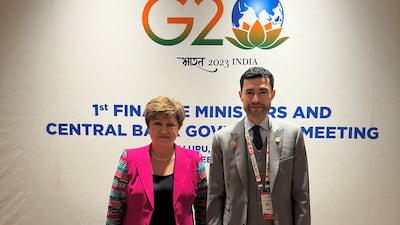The UAE’s economy continues to withstand global headwinds and is expected to achieve 4.2 per cent of non-oil economic growth by the end of this year, according to Mohamed Al Hussaini, Minister of State for Financial Affairs.
The minister made the remarks during a meeting of G20 finance ministers and central bank governors in the Indian city of Bengaluru.
The UAE economy was projected to grow by 7.6 per cent last year, the highest in 11 years, driven by the oil and non-oil sectors, after expanding by 3.9 per cent in 2021, according to the UAE Central Bank.
The country’s economy is projected to grow 3.9 per cent in 2023, according to the regulator.
First Abu Dhabi Bank forecasts hydrocarbon and non-hydrocarbon real gross domestic product growth of 5.4 per cent and 4.7 per cent, respectively, for the UAE's economy this year. Emirates NBD expects the UAE's GDP to grow by 3.9 per cent in 2023, well ahead of the World Bank’s global growth forecast of 1.7 per cent.
Mr Al Hussaini reiterated the importance of co-ordinated international action to promote climate finance.
It was also vital to strengthen joint action to set goals and draw strategies that “would achieve the best means of financing and investments needed to combat climate change and mitigate its repercussions”, the Minister said.
Climate financing has taken centre stage as countries focus on cutting emissions to limit global warming.
Clean energy investment in developing and emerging economies alone needs to increase by more than seven times — from less than $150bn in 2020 to more than $1 trillion by 2030 — to put the world on track to reach net-zero emissions by 2050, according to a joint report by the International Energy Agency, the World Bank and the World Economic Forum.
Mr Al Hussaini said the UAE has focused on building cities that bridged digital gaps by leveraging 5G and AI to "provide safety and enhance social cohesion" and enable the UAE to reduce emissions in line with its global climate change commitments.
“We have leveraged private sector participation in the development of smart cities through collaborative models that incentivise private sector involvement in areas such as clean energy, green buildings and ICT infrastructure development, which we believe to be all critical enablers for the future cities of tomorrow,” he said.
The Arab world’s second-largest economy is developing new renewable energy projects as it aims to achieve net zero by 2050. It plans to invest Dh600 billion ($163.5bn) to reach the target.
Mr Al Hussaini held a bilateral meeting with the President of the World Bank, David Malpass, to discuss the latest developments on global food and energy security, as well as the UAE’s preparations for hosting Cop28.
He also held a bilateral meeting with the International Monetary Fund Managing Director, Kristalina Georgieva, to discuss the latest global economic developments, G20 priorities for 2023, and to explore regional co-operation with the IMF programmes in the Mena region.


